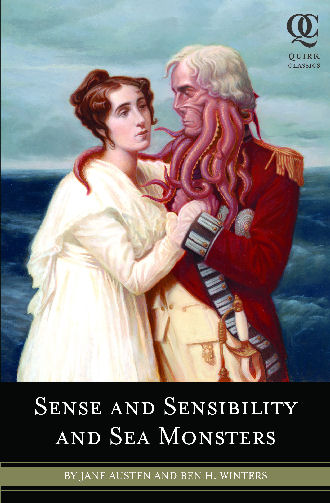Since my cousin, The Hooded Utilitarian, guest-blogged for my website a couple weeks ago about eclecticism, I have been thinking about the relative usefulness of the concept of genre, especially as it relates to my own rather unusual writing career. Genre has played a big part in my life as a writer thus far, starting with my first published novel, which was—absurdly, delightfully—Sense and Sensibility and Sea Monsters, a book-length parody of the Austen novel, for which I combined the original text with a bunch of silliness about monsters, pirates, and a giant sentient island. So it was Austen-meets-Lovecraft, Austen-meets-Stevenson, Austen-meets-Verne.
This idea was not mine but that of my publisher, Quirk Books, who had enjoyed a huge unexpected hit with Pride and Prejudice and Zombies, and hired me to do the followup. (I subsequently did a second, Android Karenina. You get the picture.) These novels spawned a raft of imitators, and a bit of mini-craze for what were labeled “mash-up” books—the idea being that you were “mashing up” a canonical novel with genre elements. Someone did Mansfield Park and Mummies, someone did a Jane Eyre with werewolves in it, I think; the guy who wrote Zombies went on to do Abraham Lincoln: Vampire Slayer.
The only thing I regret about my part in this strange period in publishing history, just a little bit, is that some folks have tended to see my subsequent work through this lens of the “mash-up.” My big project, post-Sea Monsters has been a trilogy of detective novels, beginning with The Last Policeman, set in the last year of Earth, before an extinction-level asteroid strikes the planet. “Genre mash-up master Winters is at it again!” went a typical review—the implication being that this time, instead of smashing Jane Austen together with Jules Verne, I had gone down to my wacky novelist laboratory and put science-fiction chocolate into my mystery-novel peanut butter.
Except that the new stuff isn’t like that at all, not really. The Last Policeman and its sequels are generally pretty serious, pretty straight-ahead crime novels, with the pre-apocalyptic backdrop hopefully serving to heighten the stakes and add an existential element.
Now look, I’m not complaining. I love these reviews. I love all reviews. I recognize that people who write about new work are always going to evaluate it in the context of the artist’s earlier work. What I’m surprised by and interested in is the the idea that any work of fiction (or movie, or comic, or whatever) that combines or juxtaposes two disparate thematic or stylistic elements is a “zany experiment” of some kind—as opposed to just doing what fiction (and art generally) is supposed to do, which is, you know, be interesting.
Obviously, Sea Monsters and its cousins were meant to be a very particular form of element combination, adding action/adventure elements to classics as a form of comedy—but I feel like every successful piece of art finds its power by in some way putting together unexpected things: there are doses of dry comedy in The Maltese Falcon (remember when Spade refers to the titular precious object offhandedly as “the dingus”?), there are doses of swooning romance in Dickens, there are knock-knock jokes in Bob Dylan’s song “Tweedle Dee and Tweedle Dum”.
Interesting artists, especially interesting genre artists— are always looking for ways to baffle and subvert whatever it is they’re supposed to be doing. That’s not writing a mash-up, is all I’m saying; that’s just writing.
Editor’s Note: The last book in Ben’s Last Policeman series, World of Trouble, is available now.

